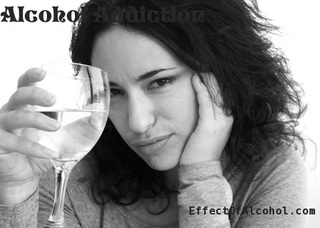Drinking too much beer, vodka, wine or tequila leads to alcohol addiction and potentially accidents and death. Consuming these types of beverages in moderation is the best approach to injury prevention.

Medicinenet.com writes:
Alcoholism is a substance-use disorder in which the sufferer has problems managing how much alcohol they drink and their lives as a result. Alcoholism is caused by a number of individual, family, genetic, and social factors rather than by any one cause.
It is known to increase the release of dopamine in the brain, which in turn is capable of affecting our moods. Thus, it can make you an addict since your brain will rely on the alcohol for the release of endorphins in your body. One way to control the effects is to eat something so the amount of liquor entering into your blood is as low as possible.
The exact cause of alcohol addiction is not known, but studies have proven that susceptibility to this kind of addiction can be hereditary. The risk of acquiring this addiction can increase several fold in families in which previous family members including parents and siblings were addicted as well. Anything that is able to change the state of our mind from consciousness to unconsciousness is said to be addictive.
Psychiatric disorders involving schizophrenia, panic attacks, anxiety disorders and depression can also be risk factors in this addiction. Furthermore, the risk of alcoholism can be affected by the way a person’s body treats this type of beverages.
It can act as a poison for some human cells and even a small amount can lead to a decrease in cell activity and metabolism. At high doses, cell death can occur. There are certain drugs that can enhance the stimulation of the hormones of the brain, for instance, dopamine and serotonin.
However, alcohol acts in a totally opposite way and decreases the concentration of such hormones. It acts as a depressant of the nervous system. It also has contrary effects on the chemical activity of antidepressant suppositories. Symptoms of alcohol abuse include confusion, fear, fever and rapid pulse.
It can be difficult to get an alcoholic to seek assistance. Drugs and alcoholism treatment centers provide individual counselling and support groups. Most addicts deny they have a drinking problem. It is best not to approach an addict in a confrontational manner, but instead seeks addiction help from trained professionals.
Remember that there are numerous interventions available when one is ready to get help. A well trusted professional can start an addict on the road to to alcohol dependence recovery. They will start by talking to him/her about changing behavior.
An important component of a recovery program is education on the harmful and the devastating effects of alcoholism.